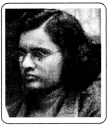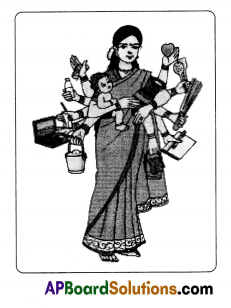Telangana SCERT TS 6th Class Social Guide Pdf 16th Lesson Towards Gender Equality Textbook Questions and Answers.
TS 6th Class Social 16th Lesson Questions and Answers -Towards Gender Equality
(Improve Your Learning)
Question 1.
Is it correct toy that girls are naturally weaker than boys? Give your reasons. (Conceptual understanding)
Answer:
it is not correct to say that because it is not proved scientifically also though they look lean and shorter than boys. physically and mentally they are as strong as boys.
Question 2.
List the household Jobs you, your brother or sister do. (Information skills)
Answer:
Myself (Girl) My brother My sister (elder) Helping mother Helping lather in Helping mother in kitchen, gardening, bringing milk, in kitchen, in cleaning, washing, newspaper, cleaning, washing. cooking, taking vegetables, etc. cooking, taking care of sick care of sick.
Question 3.
Make a list of ten employed women you know of personally. Get information about their work and earnings. (Information skills)
Answer:
| Profession’s | Work | Earning per month (in Rs.) |
| 1. Street Vendor | selling vegetables | ₹ 2000/- |
| 2. Servant maid | Household work | ₹1500/- |
| 3. Labourer in farm | fieldwork | ₹ 3000/- |
| 4. Labourer in non-agricultural works. | construction work | ₹ 4000/- |
| 5. Nurse | Treating the patients | ₹5000/- |
| 6. Businesswoman | Trading | ₹10000/- |
| 7. Teacher | Teaching | ₹ 64300/- ₹ 10000/- |
| 8. Tailor | Tailoring | ₹ 4000/- to ₹ 6000/- |
| 9. Lawyer | Justice | ₹ 10000/- |
| 10. Accountant | Accounts | ₹ 7000/- to ₹ 10000/- |
The above earnings are of approximate only.
Question 4.
If you have any elder women in the family who went to school some twenty years ago find out their experience of schooling and compare it with that of your own times. (Reflection on contemporary issues and questioning)
Answer:
There are lot of differences in previous schooling and present schooling.
| Previous Schooling | Present Schooling |
| 1) Less burden of books | 1) Heavy burden of books |
| 2) Content-based education | 2) Result-based education |
| 3) Limited sources for learning | 3) Unlimited sources for learning |
| 4) Chance for outdoor games | 4) Chance for indoor games |
| 5) Importance given to moral values or moral education | 5) importance given to moral education. |
![]()
Question 5.
Why do you think daughters are not given equal share of the property of the parents? (Reflection on contemporary issues and questioning)
Answer:
In our country, most resources like Land and factories are in the name of men. The law provides that property of parents should be divided equally among all children, in actual practice, very few girls get a share of their parent’s property which is usually given only to sons, After marriage the girl child will go to her in-law’s house. This is one of the reasons for not giving share in property. Second reason is that there is age-old belief that sons have to look after their parents and so properties are given to sons.
Question 6.
Go to some Self-Help Groups in your area and find out how they help women to gain independence and dignity. (Appreciation and Sensitivity)
Answer:
Self-help groups are started by non-profit organizations that generally have broad anti-poverty agendas. It is a village-based financial intermediary usually composed of 10-20 local women. They are seen as instruments for a variety of goals including empowering women, developing leadership abilities among poor people. An economically poor individual gains strength as part of a group. I meet Laxmi Mahila Sathi’s group in our area. 16 women formed an association and got financial help at 0.25 paise Interest under DWACRA.
Question 7.
Read the second part of page 136 and write the answer. (Reading the text (given), understanding and interpretation)
Some people feel that women are naturally physically weaker than men. They are more caring, loving, and not quarrelsome. They are, by instinct, tuned to cooking, cleaning. stitching and other household work. It is believed that they need to be protected by men. Women take care of children because they can only love and care. That is why women do all the household work because they are naturally suited to it,
Is It proper to say that women are weaker than men? Write your opinion.
Answer:
- It Is not proper to say that women are weaker than men
- Women may appear physically weaker than men but they are mentally very strong compared to men.
- Women is experienced in multitasking (doing many activities at same time) than men.
- In recent days, working women ratio have been increased who are successfully balancing both office work and household work.
- So, we can say women is no way to be considered lesser than men.
(Intext Questions)
Questions given in Box P. No. 136
Question 1.
Do you know about women who go out to work in the fields, in factories or offices? Find out about their daily work and the problems they face.
Answer:
Daily work and problems of women that work in the fields: They have to work hard directly under the scorching sun. They have to walk a long way to reach the fields, One main problem they face is no proper facilities to meet their natural calls due to lack of toilets. Sometimes, they work with bare hands on the pests applied on crops which is dangerous to health.
Daily work and problems of women that work in factories and offices. Compared with women working in fields, the women working in factories and officers are a little better as they need not work under sun. Yet, some general problems like less wages, more hard works, no stipulated timings, no proper protection while doing work with machines are common. Lack of proper facilities like toilets, resting places are common. However, the condition is improving in big factories and offices nowadays.
Question 2.
Give a list of some jobs that men and women do separately.
Answer:
Now-a-days. there is no such separation of works as awareness is increasing. Except in spiritual and religious affairs, women are equally working with men. We can list out a few works that men and women do separately.
| Men | Women |
| 1) Works involving heavy weights. Eg: Muta coolies, porters. This we can see in railway stations, bus stations. 2) Masonry works. 3) Rod bending in construction works 4) Plumber works and works with electric appliances. 5) Heavy vehicles driving. |
1) Child caretaking. 2) Midwifery. 3) Weed removing (Kalupu teeta) in fields. |
Question 3.
Here are some statements on the nature of people – can you say which are true for men only. which are true for women only and which are true for both men and women. Each student in the class should fill this table on their own.
| Quality | Women | Men | Both |
| Brave – aggressive, good in fighting | ✓ | ||
| Rational – good in maths and science | ✓ | ||
| Artistic – good in painting, dance and music | ✓ | ✓ | ✓ |
| Studious – good in studies | ✓ | ✓ | ✓ |
| Strong – good in doing heavy work | ✓ | ||
| Weak – good for light work | ✓ | ||
| Emotional – prone to crying and irrational anger | ✓ | ||
| Shy – doesn’t like to come out into the open | ✓ | ||
| Talkative- always keep chattering | ✓ | ✓ | ✓ |
| Reserved – talk very little and silent | ✓ | ||
| Loving – Good at nursing the sick and caring for children | ✓ | ||
| Tall and muscular – Good for sports | ✓ | ||
| Likes dressing up | ✓ |
After the entire class has filled up the table, the teacher should put together the majority views of the students on the blackboard. Now discuss each quality and examine what extent the majority opinion is true – discuss with the help of examples. If we go deeply into each of these qualities we will find that they apply equally to
both men and women.
![]()
Questions given in Box P. No. 138
Question 4.
Find out from your teachers and parents about these practices in your area and prepare a report for your class wall newspaper.
Answer:
In our society, the family wants to have only one boy child. The parents believe that the boys will take care of them in their old age and they will bold up their surname. That’s why girl child is looked down in the society. Girls are looked as burden to the parents. They feel that their responsibility is completed by getting marriage to the girls at such a tender age.
Questions given In Box P. No. 139
Question 5.
If you study in a co-ed school, can you make a list of things which you feel are discriminatory?
Answer:
I study in a co-education school In our school there is no discrimination between boys and girls. The teachers encourage both of them. They didn’t show any bias with anyone.
Question 6.
Each one in the class can talk to 2 persons – both men and women who have attended school only for a few years to find out the reasons why they stopped. Discuss all the reasons in the class.
Answer:
The reasons are:
- Some stopped on account of financial problems.
- Some lost interest in education as they are unable to cope up with the syllabus.
- Some stopped on health grounds.
- Many women say their parents stopped them from attending schools proposing marriages. However, this situation is changed a lot now – a – days.
Question 7.
Are there any girls in your locality or village who stopped coming to school during last year? Find out the reasons and discuss them in class.
Answer:
Very few girls stopped coming to schools. The reasons are
- Their parents felt it is useless to send girls to schools as the girls are more needed in household works.
- Their parents felt it economically burden.
- They are left with little time read in houses after doing household works. They are unable to cope up with the syllabus and understand the lessons.
Questions given in Box P.No.140
Question 8.
If you know about such people, discuss how they are treated, their problems and their earnings.
Answer:
Most of the women who are without proper educational qualifications are forced to do physical labour in the fields or mines or as domestic servants in houses of the rich people. These kinds of works make women physically back-breaking, exhausting, and often they face lack of dignity, respect, and security. They won’t gel sufficient wages for their hard work. By that, they face a lot of problems in their daily life for their survival.
Question 9.
Why do you think people like Malini earn less than hundred rupees a day even though they work hard for several hours?
Answer:
In our society, there are number of women like Nlalini who earn less than hundred rupees a day. These women are manual labourers. They are not educated enough to know that under different labour acts, the’ have the right to demand more wages. Even they know the wages and other rules, the family members do not support them to fight.
Question 10.
What are the other professions that are commonly taken up by women? Discuss them in the class.
Answer:
The professions that are commonly taken up by women are
- Teaching
- Nursing
- Tailoring
- Fashion Designing
Women who are well-educated are not allowed by their in-law families to take up professional jobs which will mean that they will have to be away from their homes for a long time. They are allowed only to take up part-time or less demanding jobs. Most of the women who are without proper educational qualifications are forced to do physical labour.
Questions given in Box P. No. 141
Question 11.
List all the work that your mothers, sisters or sisters-in-law do in the house ? When do they get up, when do they eat, when do they rest and sleep?
Answer:
The work that mothers, sister, sisters-in-law cleaning, cooking, making pickles. taking care of children, teaching children, nursing the sick, stitching clothes, filling water, purchasing provisions, etc, the work that done by them are countless. They eat after the completion of their work. They take rest and sleep after arranging everything to all family members. They get up very early before the sunrise and go to sleep very late.
![]()
(Project Work)
Question 1.
Find out from your school records how many girls are enrolled in class 1, 5, 8, 10 and 12. Does It support the view that more boys complete schooling than girls?
Answer:
Student’s activity
Question 2.
Find out from popular magazines about women who have entered professions which
were earlier considered only for of men. Prepare an album about their life and struggles.
Answer:
Women entered into all the professions which were earlier considered preserved of men. We wont find any profession without women.
Some of women professionals:
Koneru Bumpy: Once, the game ot chess is popular for men only- But. Koneru Hump shined as Grand master and created records.

Woman Astronaut; (Sunita Willams)
Bonita Williams is a US Navy officer and astronaut, born on September 19, 1965. 1 father is of Indian descent, with the family’s ancestral home in Gujarat. In December 2006, Bonita flew aboard the space shuttle to the International Space Station. where she remained aboard until April. 2007. This set the single-mission endurance record for a female astronaut, 195 days.

First woman commercial pilot: (Captain Indrani Singh)
After achieving a successful career in the aviation industry, Asia’s first woman commercial pilot Captain Indrani Singh has been molding the lives of many children and women, helping them to be self-sufficient and earn a life of respect. She started the NCC), Literacy India, which is helping more than 25 thousand women and children.

Woman leads Indian Air Force contingent for the first time in history (Sneha Shekhawat) NEW DELHI: Sneha Shekhawat from Sikar in Rajasthan on Thursday created history. when she led the Air Force contingent at the 63rd Republic Day on 2012 parade becoming the first woman pilot to do so.
Flight Lieutenant Shekhawat was assisted by three other women Flying Officers Heena Pore. Anupam Chaudhary and Pooa Negi as the 144-strong Air Force contingent marched to the tunes of Air Battle.

Question 3.
Consult parents In your village/locality and collect information about dropouts from schools.

Which category students are more in dropouts? What are reasons? Analyse and discuss In the classroom?
Answer:
Students Activity’.
Additional Questions
Question 1.
Read the information carefully and answer the questions
1. Many women availed the constitutional provision and progressed in various sectors. The special schemes, programme and provision for women helped in their empowerment.
Question.
What did the constitution provide far women?
Answer:
Special schemes, programmes and provisions were provided by the constitution.
Question 2.
Sex ratio among chi Wren under six years.
| Year | Boys! | Girls |
| 1991 | 1000 | 975 |
| 2001 | 1000 | 961 |
| 2011 | 1000 | 943 |
Question.
In which year the proportion of Girls is more?
Answer:
In 1991
Question 3.
Girls are discouraged from taking subjects like Maths and Science which are considered more apt for boys.
Question.
What are the subjects that are considered more apt for boys?
Answer:
Maths and Science
Question 4.
It is true that many farm jobs are reserved for women like transplanting rice, weeding or plucking ground nut pods.
Q. Mention some of the farm jobs done by women.
Answer:
Transplanting, weeding. harvesting, plucking ground nut pods, etc.
2. What does this picture tell:
This picture shows the woman that performs a number of works known for cleaning, cooking. making pickles, taking care of children, teaching children, nursing the sick, stitching clothes, filling water, purchasing provisions, We are to be thankful to her and have to treat her equally without any discrimination.

Two marks Questions
Question 1.
What are socially caused differences?
Answer:
The differences which lead to inequalities and discrimination are called ‘socially caused differences’ or gender differences.
![]()
Question 2.
What is Sex ratio”?
Answer:
‘The number of females to 1000 mali’s is known as Sex ratio.
Question 3.
What is our (Indian) sex ratio according to 2011 census?
Answer:
Sex ratio is 940: 1000 according to 2011 census.
Question 4.
What is the sex ratio of Telangana in 2011?
Answer:
In 2011 there were 988 females for 1000 males.
Question 5.
Whose work is left unrecognized?
Answer:
Household work of women and the work of women who work on their family friends is not recognized.
(Objective Type Questions)
Question 1.
Who is the first woman loco driver in India? ( )
A) Madhavi Yadav
B) Rekha Yadav
C) Deepthi Yadav
D) Surekha Yadav
Answer:
D) Surekha Yadav
Question 2.
What is the sex ratio of Telangana in 2011? ( )
A) 1000:969
B) 1000:931
C) 1000: 988
D) 1000: 992
Answer:
C) 1000: 988
Question 3.
The number of females to 1000 males is known as ………. . ( )
A) Sex ratio
B) Gerser discrimination
C) Sex difference
D) Sex diagnose
Answer:
A) Sex ratio
Question 4.
What is the sex ratio of Telenagana in 1991? ( )
A) 1000:931
B) 1000: 969
C) 1000: 992
D) 1000: 988
Answer:
B) 1000: 969
![]()
Question 5.
In Telangana what Is the literacy rate of women in 2011? ( )
A) 58
B) 68
C) 78
D) 48
Answer:
A) 58
Question 6.
A misconception in the society about women ( )
A) Women are physically stronger than men
B) Women are physically weaker than men by nature
C) Women earn more
D) Women take care of children.
Answer:
A) Women are physically stronger than men
Question 7.
The qualities like emotional, rational, strong are found ( )
A) in men only
B) in women only
C) in both men and women
D) neither in men nor in women
Answer:
C) in both men and women
Question 8.
The first state in India that gave right to women on ancestral property ( )
A) Andhra Pradesh
B) Tamilnadu
C) Uttar Pradesh
D) Meghalaya
Answer:
C) Uttar Pradesh
Question 9.
An example for society caused difference ( )
A) Educating girls equally with boys
B) Paying equal salaries to men and women
C) Treating women along with men
D) Subordinating women to men in all activities.
Answer:
C) Treating women along with men
Question 10.
The reason for the declining of the number of girls per thousand boys is …………….. . ( )
A) Young girls are not getting nutritious food and are dying
B) no proper medical treatment leading the girls deaths
C) foeticides
D) All the above
Answer:
D) All the above
Question 11.
Girls per 1000 boys is 975 In 1991. In 2011, there are 943 girls per 1000 boys. This shows ( )
A) girls are equally shown important with boys
B) girls are shown discrimination compared to boys
C) girls are cared more
D) No discrimination between boys and girls.
Answer:
B) girls are shown discrimination compared to boys
Question 12.
An encouraging step to remove gender bias is …………….. ( )
A) Reservations in electing representatives to government bodies
B) Slopping girls from doing hard physical jobs
C) Early child marriages
D) Less salaries to men.
Answer:
A) Reservations in electing representatives to government bodies